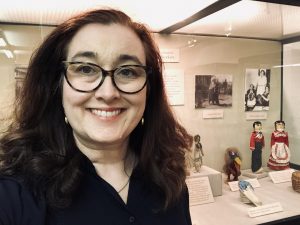by Robert Sanford
“I really want to change the ‘clubhouse.’”
Suanna Crowley and I met at the Diesel Cafe in Somerville for what would be a  two-hour interview. The week prior, I had sent an email with five questions about Suanna’s upbringing, education, and asking for information about her role at the Massachusetts Archaeological Society (MAS). Suanna texted me that she was getting a coffee and I knew when she walked over wearing sparkling grey Converse Chuck Taylor sneakers that the interview was going to be fantastic.
two-hour interview. The week prior, I had sent an email with five questions about Suanna’s upbringing, education, and asking for information about her role at the Massachusetts Archaeological Society (MAS). Suanna texted me that she was getting a coffee and I knew when she walked over wearing sparkling grey Converse Chuck Taylor sneakers that the interview was going to be fantastic.
Forty-five minutes into our conversation Suanna caught me off guard when she stated that she is affectionately known as “Dr. Dirt.” I laughed aloud and she said, “I have it as my license plate if you want to see it.” It became clear later that someone who has known since fifteen years old that archaeology would be their life’s passion would be known amongst friends and professionally as “Dr. Dirt.”
I asked Suanna about her education and upbringing and if was it always her intention to work with a cultural heritage institution, “I grew up in Washington, D.C., first in the neighborhoods around American University and later in Northern Virginia. I loved being in the houses of friends whose families spoke different languages, ate different foods, and celebrated different holidays.” Suanna understood early that she wanted to be a part of these global communities and learn as much as she could about culture, history, and countries.
At fifteen, Suanna completed a summer school program sponsored by the National Endowment for the Humanities. She recalls fondly traveling to the American southwest for a month of intensive archaeological with members of the Hopi Tribe and professors from Northern Arizona University. That was all she needed to experience and when it came time for college she attended the College of William & Mary in Williamsburg, Virginia. Her studies and research at William and Mary focused on the geosciences, specifically sedimentology, geomorphology, mineralogy. Suanna would continue on to New York University in Manhattan to obtain a Ph.D in geoarchaeology and along the way receive an M.A and a M.Phil. In Suanna’s words, “Geoarchaeology combines anthropological perspectives and geoscientific methodologies.”
Throughout its 80-year history, the core values of MAS are the dual goals of preservation and education. Opening in 1988, the Robbins Museum at MAS is an important repository for statewide materials related to the Indigenous Peoples of New England. The museum’s collection tops 150,000 objects and its ethnographic materials include a group of rare figurines and dolls from Native American Tribes across the US.
Crowley herself wears many hats at MAS. Organizational efforts include setting the vision and agendas for annual meetings, management of the board and museum volunteer teams, and coordination with outside partners. Suanna leads the Development Committee which includes doing research on prospects and grant writing. While her tenure as President is limited to two two-year terms she is conscious of posterity. A topic we talked about in our interview was “changing the clubhouse.” Not a coup d’état, but a change in values and strategy. In the current economy, patrons are not paying for membership and outreach is as crucial now as it ever has been in years prior. Patrons are more concerned about what the institution can do for them and not what they can do for the institution. A significant change that Suanna is making at the upper echelon is repairing relationships with tribal communities, something that, in the past, has not been a priority of MAS. The relationship that the tribal communities have with these artifacts is a top concern for Suanna and repatriation is a priority for MAS. According to Suanna, the MAS is in a period of transition. They are actively reviewing their mission and organization. Crowley states “We are growing in the direction of a more open, accessible, useful resource for researchers, tribal affiliates, and the general public.”
My closing question to Suanna was, “What do you tell people you do?”, her response was simple, “I am an archaeologist. Even though my career path has taken me in several different directions, the underlying professional identity is the same. What I’ve done with it is much more than I expected.”
Further information about the Massachusetts Archaeological Society can be found on their website https://massarchaeology.org
